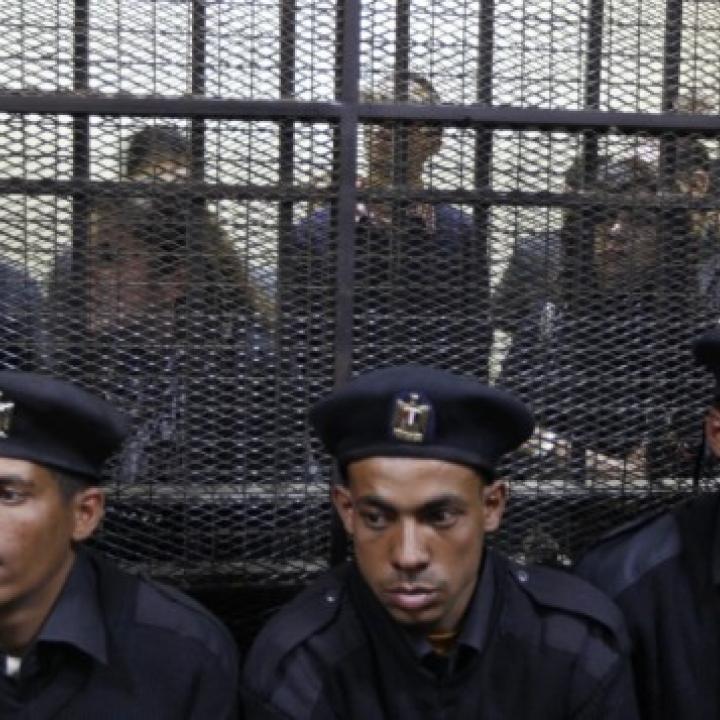
- Policy Analysis
- PolicyWatch 2521
A More Constructive U.S. Egypt Policy

Following their latest visit to Egypt, the former congressman and White House counsel who constitute an Institute task force shared their views on the country's leadership, economy, and prospects for better ties with Washington.
On November 5, 2015, Vin Weber and Gregory B. Craig addressed a Policy Forum at The Washington Institute covering their recent visit to Egypt and resulting report. The following is a rapporteur's summary of their remarks.
VIN WEBER
Egypt's situation is more complicated than it was three years ago -- although not necessarily worse or better. In 2012, the public was worried about the economic situation and foreign policy under former president Mohamed Morsi, a Muslim Brotherhood leader. As for today, a recent visit showed one upside to be a sense of reassurance by secular Egyptians that no Islamic republic is imminent. A downside is that the society is more polarized than ever before, with looming issues including a rapidly growing population that requires an exceptional economic growth rate of 10 percent.
Separately, the present government enjoys a much stronger relationship with the military -- a revered institution across most of Egypt -- than did its predecessor. This said, the military has failed to achieve many of its objectives. In particular, Israeli and U.S. officials share concerns about the Egyptian military's actions in its fight against terrorism in the Sinai Peninsula. The recent downing of a Russian airliner points to a range of related tensions. For example, the Suez Canal represents an important node in the U.S.-Egypt relationship, and the related security threat troubles both actors. The Egyptian government, for its part, has voiced fury over some reactions to the crash, including the British government's decision to cancel flights out of Sharm al-Sheikh.
One of the greatest underappreciated problems for Egypt is the sense, held by virtually every sector of society, that the U.S.-Egypt relationship is deteriorating. The suspicion that the U.S. government is against Egyptians can only be ameliorated through engagement. Diplomacy's power was exemplified earlier this year by the release of jailed U.S. citizen Mohamed Soltan. The U.S.-Egypt relationship is hugely important for both sides, but the focus should now be on incremental, rather than radical, progress.
Given the amount of turmoil Egypt has experienced in recent years, a convincing argument can be made that the Egyptian people need a period of stability. The government is still in a honeymoon period with most Egyptians, but it will eventually be judged based on its performance. If the government cannot meet the people's demands, the people could return to the streets, even if such a development is not expected any time soon. Antidemocratic activity by the government, however, hardly makes for a contented public, and improvements in this area can make a return to the streets less likely.
Elsewhere, the expansion of the Suez Canal appears to reflect a political strategy rather than an economic strategy. Generally, President Abdul Fattah al-Sisi has undertaken initiatives that the Egyptian people can understand immediately. Sisi's failure, however, to demonstrate a viable economic strategy could be another trigger for Egyptians to return to the streets.
Given this background, Egyptian officials are seeking increased U.S. aid and Washington's encouragement of business investment in Egypt. Congress, though, is unlikely to be sold on boosting aid to Egypt. Relatedly, some U.S. policymakers may perceive wrongly that Sisi represents the military. To the contrary, Sisi operates very much independently of the military, which creates many jobs and thereby seeks to increase its own prestige.
GREGORY B. CRAIG
Dramatic differences separate Egypt in 2012 from Egypt today. These differences include the military's conduct and the public's opinion of the military. In 2012, the military was not a popular institution, but today perceptions are much more positive. During the recent trip, Egyptians strongly criticized the United States and cast Egypt's security threats in cataclysmic terms. The military believes it is besieged from every side, including Libya and Sinai. Egyptian military officials are thus likely working more closely with the Israeli intelligence community than ever before.
Also different is the position held by Islamists. Whereas in 2012 Islamists were front and center, now this entire societal segment is hidden from view. Despite this, parliamentary elections were held to broaden political participation, which represents an obviously preferable alternative to violence. Yet through unfair imprisonments, the Egyptian regime may be pushing people to pursue these violent responses. Today, a deeply polarized Egypt may be attributed in part to leaders' unwillingness to compromise. Conspiracies also abound regarding U.S. intentions, including the belief that ISIS was created by Washington to weaken the region.
On economic policy, the Egyptian government is placing its hopes in a large infrastructure project. This represents a way to put people to work, which may have a short-term benefit. Whether it has a long-term payoff is unknown. Given the visible investment of much public money, the economic sphere offers an opportunity for the United States to make inroads -- focused on encouraging the setting of concrete objectives -- with small diplomatic successes possibly emerging in the process. However, 40 percent of the economy is under the military's control, making reform very difficult. Congress will therefore likely be more willing to increase funding for antiterrorism activities than to boost economic aid.
Despite the challenging situation, the U.S. embassy is very surefooted and led by a terrific ambassador. A policy rooted in constructive engagement with Egypt can be sustained over time. Moreover, the United States can engage without condoning human rights violations or abuses. President Barack Obama should not invite Sisi to Washington unless Sisi shows willingness to discuss the entire agenda.
This summary was prepared by Erica Wenig.




